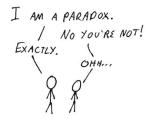Is there some way that having power undermines one’s willingness to use persuasion to engage employees? That is the question.
The answer is “No!”…. If you think persuasion means strong-arming someone into compliance by the strength of your arguments or the power of your position.
Of course, if you think that, you see persuasion, whether wittingly or unwittingly, as simply the verbal exercise of power. So it begs the question.
Without diving into a definitional swamp[1], what’s relevant to know about persuasion for our purposes is that, insofar as it is effective, it is a “learning and negotiating process” that involves “discovery, preparation, and dialogue,” that can take “weeks or months of planning” before you can “lead colleagues to a problem’s shared solution.”[2] In other words, effective persuasion is a relationship that requires and rewards a deep investment in listening.
So what does this all have to do with power? Simple: the powerful don’t listen! Actually, it’s even more subversive than that: “not only does the experience of power lead individuals to be less open to using advice from others, but… power can lead individuals to discount advice even from individuals who have high levels of expertise.”[3]
The key words here are “experience of power.” According to Leigh Plunkett Tost, of Duke University’s Fuqua School of Business, who graciously shared her research findings with me, the subjective experience of power has psychological effects that work against the need to persuade others.
What is it about power that undermines an orientation toward using persuasion? Tost’s and others research suggest that a subjective experience of power:
- Produces a sense of optimism, diminishing the perception of high risk.
- Creates an inflated sense of control, generating overconfidence in one’s capabilities.
- Heightens one’s sense of the superiority of one’s own opinions and perspectives, undermining the desire to depend on the insights of others.
- Enhances a sense of competitiveness, creating a desire to demonstrate superior knowledge in the face of unsolicited advice, even from experienced counselors with high expertise.
The result is what Tost calls the “paradox of power”: “greater decision rights are often coupled with a power-induced neglect of the judgments of others.”
 In other words, there is something about power that undermines a leader’s desire to engage others’ input and opinions, and therefore to feel a need to exercise persuasion and influence.
In other words, there is something about power that undermines a leader’s desire to engage others’ input and opinions, and therefore to feel a need to exercise persuasion and influence.
This is not good news. In fact, it’s quite sobering for those of use who counsel senior leaders, because it adds a subtle, complicating psychological factor to what is already a difficult, complex job.
But it’s not all bad, either, because this research provides concrete, data-backed insight into what had simply been an intuition based on experience. As Ronald Reagan might put it, “Trust your intuition, but verify.” Now we have important verification.
Good, as well, in that it provides a nice explanatory and analytical framework to understand leadership behavior that can often seem self-defeating.
What’s ugly about this, or at least makes a complicated situation more complicated, is that the research expands awareness, yet doesn’t provide any easy answers. As a senior leader, how can you manage your way through the “power paradox”? How do you transcend the allure that comes with the “subjective experience of power,” and ensure you rely on persuasion and influence to incorporate the wisdom and engage your employees?
More weighty questions. I’ll save those for my next vacation.
[1] Trying to define and describe persuasion and what makes it effective is a sinkhole: it can easily take two semesters of study just to keep your feet firmly planted on the ground. If you’re inclined to self-school on the subject, consider starting with: (1) James B. Stiff, Persuasive Communication; or (2) Jim Dillard’s Persuasion Handbook.
[2] Though it is somewhat simplifying, a very smart and practical look at what makes for effective persuasion comes from “The Necessary Art of Persuasion,” a classic HBR article by Jay Conger, the Henry R. Kravis Research Chair in Leadership Studies at Claremont McKenna College.
[3] “Power, Competitiveness, and Advice Taking: Why the Powerful Don’t Listen,” Leigh Plunkett Tost, Duke University, lead author, soon to be published in the journal, Organizational Behavior and Human Decision Processes.



Interesting article – thanks for sharing.
John
http://johntdoh.blogspot.com/
Thanks for reading.